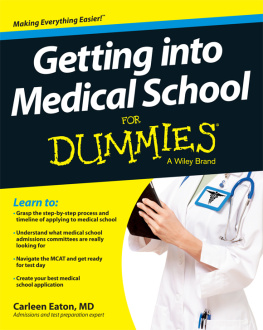
About Petersons
To succeed on your lifelong educational journey, you will need accurate, dependable, and practical tools and resources. That is why Petersons is everywhere education happens. Because whenever and however you need education content delivered, you can rely on Petersons to provide the information, know-how, and guidance to help you reach your goals. Tools to match the right students with the right school. Its here. Personalized resources and expert guidance. Its here. Comprehensive and dependable education contentdelivered whenever and however you need it. Its all here.
For more information, contact Petersons, 2000 Lenox Drive, Lawrenceville, NJ 08648; 800-338-3282; or find us online at www.petersonspublishing.com.
2009 Petersons, a Nelnet company
Previous editions 1996, 2002, 2004
ALL RIGHTS RESERVED. No part of this work covered by the copyright herein may be reproduced or used in any form or by any meansgraphic, electronic, or mechanical, including photocopying, recording, taping, Web distribution, or information storage and retrieval systemswithout the prior written permission of the publisher.
For permission to use material from this text or product, complete the Permission Request Form at www.petersons.com/permissions.
eISBN-978-0-7689-3673-5
Undergraduate Grades and Entrance-Exam Scores Dont Tell the Whole Story
T he admission process today for graduate and professional schools is more competitive than ever. The increase in applications to these schools has been especially dramatic in recent years, due to a shrinking entry-level job market for recent college graduates. Schools are flooded with applications from many well-qualified candidates whose entrance-exam scores and undergraduate grades are almost identical. Admissions officials recognize that the numbersGPA and entrance-exam scoresdont tell the whole story about any candidate. The schools are looking for more than proficient test takers; they are also looking for people who are interesting, articulate, and distinctive, with different points of view, ambitions, backgrounds, and interests. A diverse and interesting student body enriches the academic experience for everyonestudents, faculty, and administration. And it is interesting and distinctive people, not necessarily those who perform well on exams, who are likely to succeed in the long run in their chosen professions. (The admissions and alumni offices are symbiotically connected, and they know it.)
How do the decision makers look at the human being behind the application? The answer: through essay questions on the admissions applicationcommonly referred to as personal statementsas well as through letters of recommendation and in-person interviews. This book will demystify these critical aspects of the admissions process. Here you will learn:
- How to create and write personal statements that respond to the questions that appear on the applications of many popular graduate schools
- Whom to approach for letters of recommendation
- How to make the best impression at your interview
In addition, youll review thirty actual personal statements from successful graduate- and professional-school applicants. And youll get inside advice about the entire admissions process from admissions officials at top schools from coast to coast.
Youve made the decision to apply to a graduate or professional school. How to Write the Perfect Personal Statement will help you craft the best responses to questions on graduate-school applications and prepare you to do your best in interviews. Good luck!
GIVE US YOUR FEEDBACK
Petersons publishes a full line of resources to help guide you through the graduate school admission process. Petersons publications can be found at your local bookstore, library, and college guidance office, and you can access us online at www.petersonspublishing.com
PART 1
Creating Perfect Personal Statements
T he personal statement portion of a schools admissions application presents a great opportunity for you to sell yourself to the school. However, this critical part of the application can be a source of great anxiety and worry for the applicant, who may wonder:
- Who will read my essay?
- How will my essay be evaluated?
- Should I just play it safe and say what they want to hear? If so, what exactly do they want to hear?
- Should I take a risk and submit something that is sure to make the admissions committee notice me? If so, how can I ensure that I dont offend committee members or turn them off?
- Should I discuss that glaring blemish in my past, or should I ignore it?
Turning such questions over in your mind can be paralyzing. Moreover, because the questions posed in the applications are generally open-ended, you may still wonder after writing your personal statement whether it is appropriate and effectivethat is, whether it will help you to gain admission. To solve these problems, you simply need more information about the admissions process. Lets begin by looking at personal-statement questions that are typically posed on admissions applications.
THE QUESTIONS
The particular essay questions appearing on the applications vary widely among the schools. Some applications provide very little guidance as to what you should write. Others include specific questions. Although some schools impose a word or page limit on your response, others do not. Some schools require only one personal statement; others might require several essay responses. Some schools require a mandatory statement and one or more optional essays. The following list is a representative sampling of the sort of questions appearing on graduate and professional school applications.
Topics That Are Extremely Open-ended
- Provide any additional information you wish to bring to the attention of the Admission Committee. You may wish to discuss particular accomplishments, activities, employment, hobbies, or professional goals.
- We require all applicants to submit a personal statement. The statement should describe any unusual aspects of your background that might contribute to the diversity of our student body as well as describe any extraordinary skills or traits that you might possess, which would be relevant to us.
- Please submit a personal statement not exceeding 500 words in length on a matter that interests you.
Topics That Call for You to Discuss Your Past Experiences
- Please discuss any significant activities or work experience that might enrich your study at our school.
- Describe an experience (either personal or professional) in which you failed. What did you learn from that experience?
Topics That Inquire About Your Motives, Goals, and Ambitions
- Tell us your reasons for seeking a professional education.
- At this point in your life, what motivates you to consider further education at our school?
- Discuss the aspects of your background and experience that have led you to choose a career in...
- This statement is your opportunity to introduce yourself to the admissions committee and to discuss your personal and professional goals.
- How would you want your professional achievements and contributions to be remembered after your death?
- Discuss how a degree from our school/program will assist you in reaching your short- and long-term goals.
Topics That Require Self-Assessment or Insight About Your Personality
Next page
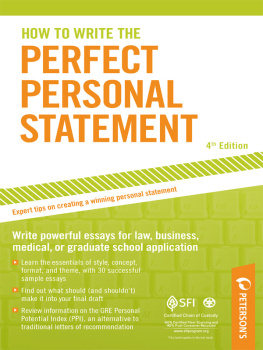

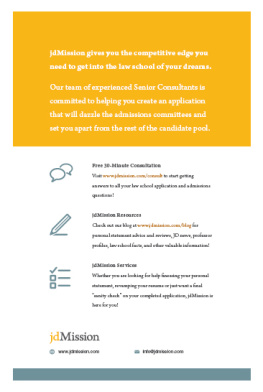
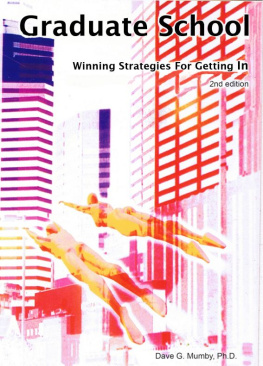
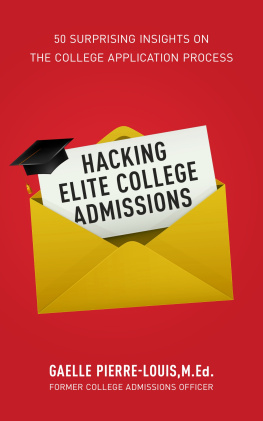
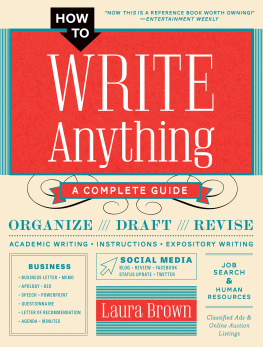
![Reding - Grads Guide to Graduate Admissions Essays] : Examples from Real Students Who Got into Top Schools](/uploads/posts/book/101661/thumbs/reding-grad-s-guide-to-graduate-admissions.jpg)
